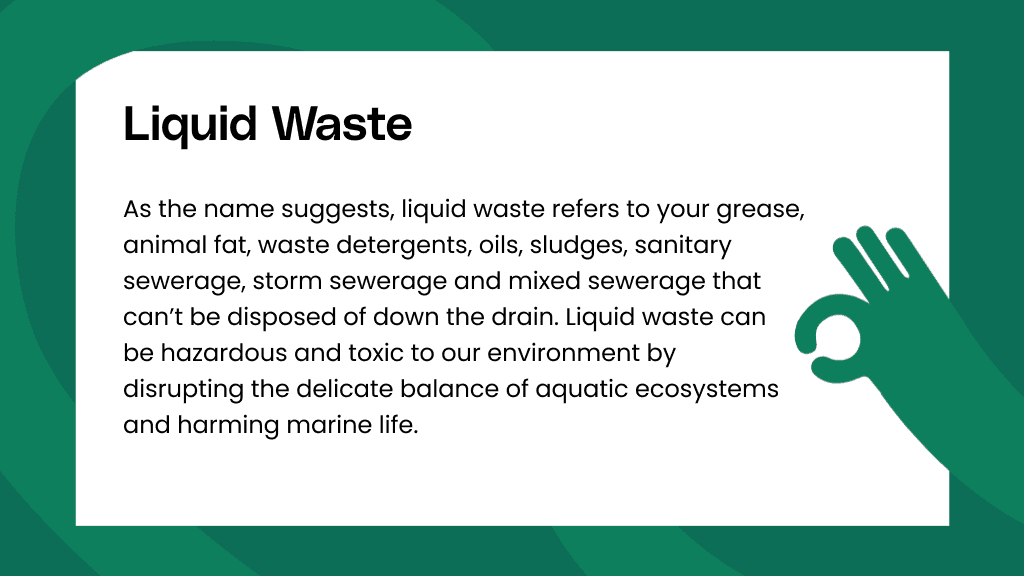The 8-Second Trick For Reclaim Waste
The 8-Second Trick For Reclaim Waste
Blog Article
4 Easy Facts About Reclaim Waste Shown
Table of ContentsMore About Reclaim Waste7 Simple Techniques For Reclaim WasteThe Basic Principles Of Reclaim Waste The Greatest Guide To Reclaim WasteLittle Known Facts About Reclaim Waste.
Check out the kinds, occurrences, and kinds of liquid waste. Domestic sewer waste describes the waste and products from a property sewage-disposal tank. This kind of waste is developed by humans in residences, schools, and other structures. This only consists of septic systems that have a drain field. The appropriate monitoring and disposal of residential sewage waste need liquid waste to be transferred to a sewer treatment plant where the proper methods and tools are related to detoxify and dispose of waste.
Business waste usually includes potential risks, such as combustible materials or a blend of liquid and strong waste items, and needs an advanced and thorough disposal procedure. The disposal of commercial waste typically entails the filtering of waste before transportation to make sure secure and appropriate disposal. Hazardous waste is produced from byproducts and drainage of industrial processes and manufacturing.
This kind of waste can not use the same sewage monitoring transport or procedures as septic or business liquids. The industrial waste monitoring procedure needs the evaluation and testing of fluid waste before it undergoes the disposal process (industrial wastewater treatment). Drainage waste is the fluid waste that originates from runoff and excess stormwater in very populated areas or cities
Runoff waste can create contamination and flooding if not taken care of appropriately. Ensuring proper waste monitoring can protect against disasters and reduce ecological harm.
Fascination About Reclaim Waste
Contact PROS Services today to find out about our waste monitoring and disposal solutions and the appropriate means to care for the fluid waste you create.
(https://www.goodreads.com/user/show/183557660-leon-aube)This supposed 'wastewater' is not only a vital resource however, after treatment, will be released to our land, rivers or the sea. Made use of water from toilets, showers, bathrooms, kitchen area sinks, washings and industrial procedures is understood as wastewater.

water used to cool machinery or clean plant and equipment). Stormwater, a type of wastewater, is drainage that moves from agricultural and urban locations such as roofing systems, parks, gardens, roadways, paths and gutters right into stormwater drains pipes, after rain. Stormwater streams untreated straight to local creeks or rivers, eventually reaching the ocean.
Reclaim Waste Fundamentals Explained
In Queensland, the majority of wastewater is dealt with at sewage treatment plants. Wastewater is delivered from domestic or commercial sites through a system of sewage systems and pump terminals, called sewerage reticulation, to a sewage therapy plant. City governments construct, maintain and operate most sewer therapy plants. Operators are accredited under the Environmental Management Act 1994 to discharge treated wastewater at an acceptable environmental requirement into rivers.
The Division of Natural Resources suggests local governments about managing, operating and maintaining sewage systems and treatment plants. In unsewered areas, city governments may require homeowners to mount specific or family sewage treatment systems to deal with domestic wastewater from toilets, kitchens, washrooms and washings. The Division of Natural Resources authorizes using house systems when they are confirmed to be reliable.
A lot of stormwater obtains no treatment. In some brand-new communities, therapy of some stormwater to remove trash, sand and crushed rock has actually started using gross contaminant catches. Wastewater treatment occurs in four phases: Gets rid of strong matter. Larger solids, such as plastics and other items mistakenly released to drains, are removed when wastewater is gone through displays.
Utilizes tiny living organisms recognizes as micro-organisms to break down and remove staying dissolved wastes and great particles. Micro-organisms and wastes are integrated in the sludge.
The Only Guide to Reclaim Waste
Nutrient elimination is not readily available whatsoever sewer treatment plants since it calls for costly specialized equipment. It is coming to be a lot more typical in Queensland. Clear liquid effluent created after treatment may still contain disease-causing micro-organisms. If this effluent is released right into rivers such as rivers or the sea, the micro-organisms will ultimately pass away out.

This normally implies wastewater has actually to be treated or contaminants removed before it can be discharged to waterways. Most wastewater flows into the sewage system. Under the Act, city governments administer authorizations and licences for ecologically relevant activities (ERAs) entailing wastewater launches that could have a local effect. The division carries out approvals and licences to ERAs entailing wastewater releases that may have a local or statewide impact.
4 Simple Techniques For Reclaim Waste
Surveillance gives factual information concerning water quality and can confirm that licence conditions are being met. The details obtained with tracking provides the basis for making water high quality choices.
Report this page